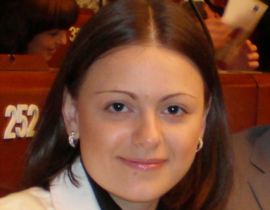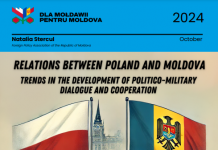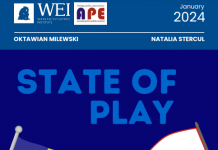Background
In the last twenty years, Republic of Moldova registered a series of major changes in political, economic, social and cultural field. The collapse of the Soviet Union generated a continuous transition process in all spheres of human life that led to the emergence of new social phenomena or deepening existing ones, migration of working – age population being one of them. Migration is determined mainly by the lack of jobs and low wages, unstable political situation, lack of social and economic security. According to statistics provided by National Bureau of Statistics, in 2010 around 311 000 people were abroad working or seeking work. At the same time, it is assumed that the actual number of unofficial migrants is around 600 000 people.
Once established in the host countries, Moldovan migrants began to organize themselves in public organizations with the status of public associations of foreign citizens, aimed at preserving national and cultural identity, and ensuring their fundamental rights. Currently, the Moldovan authorities have established links with 60 public associations of the Moldovan Diaspora in 21 countries. Most public associations are registered in Italy (20), Ukraine (14) Russian Federation (11), the French Republic (6), the Portuguese Republic (4) Canada (3) and USA (3).
Moldovan Diaspora associations are mainly rudimentary organizations that need to be strengthened and sustained by authorities in Chisinau in order to have a real and visible impact in host countries. So far, they have been set up chaotically while the links and networks of communication and cooperation between them are very weak or dont exist at all. As a result, the impact of their work is inconclusive and often imperceptible. Also, this fact prevents our Diaspora from playing an important role in promoting foreign policy objectives of the R. Moldova.
The number of Moldovan migrants is significant and the effects of their stay abroad concern both the political and economic situation of our country. Being absent from political life Moldovan citizens living abroad, which are clearly a political force, cannot fully exercise their civil rights as well as protect their fundamental rights although they have a major contribution to the economic development of the state. Remittances are a key element of economic growth even though they are directed more towards consumption than for small and medium business development.
Migration of Moldovan citizens abroad to find jobs has led to the emergence of social and economic problems such as: increasing the number of abandoned children, destroyed families, depopulation of Moldovan villages, shortage of skilled labor, socio-economic degradation in rural areas, but also the appearance of a new set of problems faced by migrants directly once they arrive in the host country (violation of fundamental rights, lack of social protection, deficient consular services, lack of adequate legal advice, distortion of cultural traditions, denationalization etc…).
Institutionalization of the R. Moldovas Diaspora
So far, the Moldovan authorities have undertaken a series of actions aimed at creating a legal and institutional framework for promoting and protecting the rights of our citizens abroad, but the process proved to be slow and difficult.
In 1994, in the framework of the Department of National Relations today Bureau for Interethnic Relations was created the Department of International Relations, European Integration and Diaspora. Initially the departments activity focused on supporting the Moldovan Diaspora by promoting national and cultural traditions, establishing links of cooperation between public organizations of Diaspora and the authorities in Chisinau.
According to Governmental Decision No. 1322 from 29.12.2000 regarding measures to support people from R. Moldova residing abroad, was established on a voluntary basis, the Coordinating Council to support people from R. Moldova residing abroad (hereinafter called the Council) and in its nominal composition were included representatives from various relevant structures at the vice-ministers, presidents and general directors level. The main activities of the Council have been classified under four areas: human rights, culture, education and training, social protection. Although those areas are of utmost importance in improving daily life of our Diaspora representatives, real actions taken by the authorities proved to be less efficient and focused more on area initiatives such as :
– social area: Support persons from the R. Moldova residing abroad to obtain entry visa to R. Moldova, return and re-establish in the home country, to enroll in the educational system or assist them in finding a job”;
– education and training: Granting necessary assistance to persons from the R. Moldova residing abroad and to their ethno-cultural organizations in fulfilling the right to study their native language, literature, history, geography of historical homeland, in accordance with international law, the law of the state whose citizens they are and interstate agreements to which R. Moldova is part of.”;
– human rights: 1. Support free development of the persons from the R. Moldova residing abroad, in accordance with principles of international law and the law of their country of residence; Establish contacts with people originating from the R. Moldova residing abroad and their public organizations; 2. Provide through diplomatic missions organizational, methodological and legal assistance to persons from the R. Moldova residing abroad.”
In 2005 was set up under Governments supervision the Coordinating Council of the R. Moldovas citizens residing abroad which comprised leaders of Moldovan non-governmental organizations from abroad and Government representatives. The Coordinating Council of the R. Moldovas citizens residing abroad had to function as a consultative body aimed at expressing and presenting the interests of Moldovan Diaspora to R. Moldovas state bodies. The set up of a new Council did not favor qualitative change; its activities were confined to sporadic meetings, usually during the Moldovan Diaspora Congresses.
Political changes in 2009 determined the authorities to give greater importance to its citizens abroad understanding that they are a political and economic force. Moldovan Diaspora topic started to be discussed in qualitatively new terms and later included in the Activity Program of the Government of the Republic of Moldova for 2011 – 2014.
1.Enhance bilateral dialogue with the countries with large communities of Moldovan
citizens and sign proper agreements to secure their social protection;
2.Develop a wide policy to support Moldovan citizens living abroad; create a proper institutional framework and develop an action plan to support them.
3.Ensure portability of social security rights of migrant workers, by negotiating and signing
bilateral agreements on social security with the host countries;
4.Extend legal opportunities of employment for Moldovan citizens abroad, by signing bilateral
agreements on labor migration with the destination countries;
5.Implement joint initiatives with the destination countries aimed at facilitating the return of
migrant workers and their reintegration on the Moldovan labor force market, including
under the Moldova-EU Mobility Partnership;
6.Encourage reintegration of migrant workers returned home by providing counseling and
support in terms of recognition of skills acquired and starting up their own business;
7.Create conducive environment to bring in remittances in investment projects for sustainable
development.
Weaknesses of the legal and institutional support granted to the R. Moldovas Diaspora
After analyzing the current legal and institutional framework for supporting the Diaspora we have identified the following deficiencies:
1.Lack of a comprehensive strategic vision to support the Diaspora. So far, the central authorities have focused mainly on activities of preserving national and cultural identity of persons originating from R. Moldova residing temporarily or permanently abroad. These activities consisted especially in supplying the public organization of Moldovan Diaspora with state symbols (flag, emblem, anthem, audio and video recordings, national costumes, subscription to various periodicals, organizing activities during national holidays, expenses for participation of public organizations leaders at the Congresses, etc…). However, the problems our citizens face in host countries are more extensive. Also, their migration abroad has profound implications on the social and economic development of Moldova. Therefore, support offered to Moldovan Diaspora should be based on a comprehensive and integrated approach regarding problems our citizens face in the host states, but also in their own country. To be precise, on such an approach should be based the development of a State Strategy to support Diaspora, which would draw the principles, objectives and main directions of activity.
2.Lack of governmental institutions able to formulate, coordinate, implement and monitor state policies aimed at supporting the Diaspora. For example, it is obvious that the current institutional framework, represented in particular by the Department of International Relations, European Integration and Diaspora of the Bureau for Interethnic Relations, has no authority and no proper resources to cope with the volume of existing activities, both in terms of staff (5 persons of which 3 are active) and in terms of activities of the Bureau for Interethnic Relations. Over the years, several initiatives have been proposed regarding the institutional structure that should manage this issue and the Government recently decided to create an Agency for Diaspora, which will develop links with Moldovans working abroad and also will coordinate the implementation of state policies in the field of migration. The Agency will be supported by several ministries: the Ministry of Education, Ministry of Finance, Ministry of Foreign Affairs and European Integration and Ministry of Labor and Social Protection. The decision to create an Agency for Diaspora and to include a greater number of issues concerning Diaspora in the Activity Program of the Government of the Republic of Moldova for 2011 – 2014 is a major step in changing the perception of the needs of our citizens living abroad. So far, we didnt see a clear description of duties and the institutional organization of the Agency, which should be a viable institution capable of managing the Moldovan Diaspora subject and be permanently in direct contact with related ministries and institutions.
3.Insignificant financial resources allocated to support Diaspora. Given the wide range of activities, the resources allocated by the Government can no longer be limited to 150,000 lei, which was the budget amount for 2011. Also, should be excluded from Governmental provisions and decisions vague expressions as …the above-mentioned program will be at the expense and limit of financial availability of the bodies responsible for achieving …”, which allows institutions to decide at their discretion, whether or not they can afford to support Diaspora activities. To have a noticeable effect is needed to include in the budget a separate heading for future activities undertaken by the Agency to manage the Diaspora issue.
4.Insufficient training of our diplomatic missions representatives in communication and cooperation with Diaspora. Moldovan embassies in host countries must be accessible, professional institutions, promoters of consular, informational and legal assistance. Currently, because of reduced financial resources, the embassies activities concerning relations with Diaspora are limited to occasional meetings on national holidays and granting consular assistance. Unfortunately, so far, our diplomatic missions have failed to become a coagulator of the Diaspora. Recently, the Ministry of Foreign Affairs and European Integration has launched an initiative called The embassy comes closer to you” which aims to facilitate access to consular services. This initiative is admirable, but it is equally important for the Moldovan embassies to be perceived, not only as contact points, but especially as catalytic core of permanent activities / interactions within the Diaspora. Moreover, they should be more actively involved in supporting and encouraging the process of institutionalization of Diaspora, thus multiplying their capacity to defend their interests and rights in host states. This requires an active involvement in a broad spectrum of activities that involve: additional financial resources, strategic vision, an action plan agreed with Diaspora organizations, well trained diplomatic staff responsible directly for relations with Diaspora.
Recommendations:
Given the weaknesses of the legal and institutional support for the R. Moldovas Diaspora, we consider appropriate to make the following recommendations:
1.Develop a strategy to support the R. Moldovans Diaspora, which would draw the principles, objectives and main directions of activity; provide a comprehensive and integrated approach of the problems that our citizens are facing in the host states, but also in their own country;
2.Involve civil society and especially representatives of R. Moldovas Diaspora in the development of future regulation of the Agency for Diaspora.
3.Establish a separate heading in the Republic of Moldovas budget concerning the allocation of financial resources for initiatives meant to support people from Moldova residing abroad;
4.Establish a national Foundation to support Diaspora that would attract financial resources from the private sector, international organizations, charitable foundations, etc…);
5.Initiate training of our diplomats in the field of communication and cooperation with Diaspora;
6.Supplying diplomatic missions with necessary human and financial resources to develop a consistent and coherent cooperation with Diaspora organizations.







